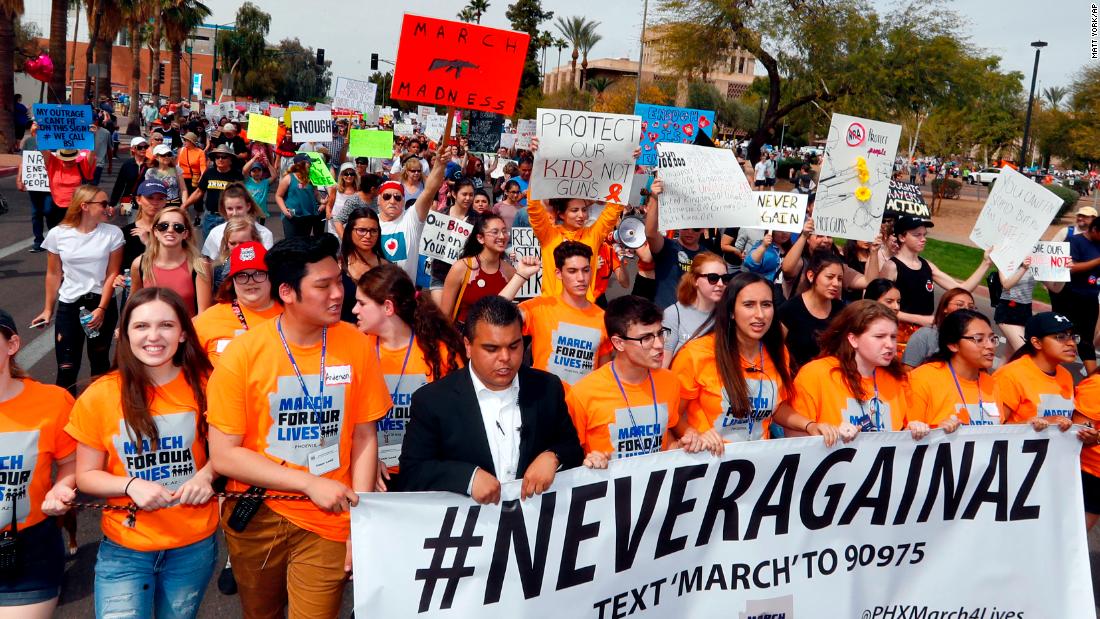
High school students in Arizona were big movers behind legislation this year.
The full text of one bill, HB 2962, was short enough for a bumper sticker: "Lemonade is the state drink."
After passing the House of Representatives, it cleared the Senate as well this week.
The other one, HB 2597, was a bit longer and called for more high school counselors to address mental health issues students have. It was championed by young activists associated with the March For Our Lives movement, and would have required schools to come up with school safety plans by 2022.
That bill said school officials should be able to "provide recognition, initial screening, and responses to emotional or behavioral distress in students."
It sailed through the Senate. In the House, it passed through both the House Education and Public Safety committees. But it died in the Rules committee.
State Sen. Juan Mendez told CNN that a purely symbolic bill had passed while a substantive one, with bipartisan support, didn't. Lawmakers were acting to "undermine the power the youth are trying to build," he said.
A high school student shepherded a symbolic bill through the legislature
Rep. Warren Petersen sponsored the lemonade bill.
He said a high school student named Garrett Glover contacted him last year with the request to make lemonade the state drink.
"He was diligent and followed up. He came down to my office and I met with him," Petersen said.
Arizona is known for citrus. The House majority leader agreed to sponsor the bill and walked Glover through the process of how it might become a law. Reps from the lemonade industry showed up in a committee hearing to talk about the importance of lemonade.
Some senators registered protest votes, and defeated the bill. But Petersen and Glover persevered, convincing a few senators to change their minds.
Both chambers passed the bill and it was sent to the governor's desk for signing.
But real reform is much harder
Mendez, a Democrat, said that there was "an insulting contrast" between the trajectories of the two student-led bills.
He said he first took office in 2012 and had seen lawmakers trumpet high school students who brought up these types of bills on a regular basis. In 2015, a fourth-grade class called for making copper the state metal, and lawmakers obliged. Later, an 11-year-old boy suggested that Arizona have a state dinosaur in 2018. He got a bill passed elevating the sonorasaurus to a state symbol, according to AZ Central.
Mendez voted against the state drink bill this year, like he did the others. He said colleagues who sponsored the laws were "grandstanding" and would say "'isn't it great that we're helping (students) understand the process?'"
Mendez said he cut his activist teeth in college campaigning for the DREAM Act. He applauded the young people who stepped up for safer schools, and argued that letting the more substantive bill die in committee sent a signal to young people that their voices didn't matter.
"There's a saying, 'Power corrupts. Absolute power corrupts absolutely.'" he said. "It's the same way with powerlessness. It corrupts too. This contributes to why the youth are so jaded."
School safety activists have been building coalitions
Meanwhile, a year of actions involving thousands of Arizona high school students was hitting a brick wall.
Jordan Harb, the executive director of the Arizona chapter of March For Our Lives, told CNN that his group had stage a "die-in" last year to motivate lawmakers to make school safety a priority.
They held 14 rallies across the state, including one at the State Capitol that attracted 15,000 supporters. They got 15 school districts to pass school safety resolutions, he said. And they gathered hundreds of students from across Arizona in a convention to ask them to rank their top priorities around school safety.
"People brought up police accountability, gun reform, and stop orders," Harb said. "But nearly everyone mentioned mental health."
Harb said discussions of students' mental health are often burdened by the specter of suicide, particularly with teens' social-media-drenched lives. So they came up with an idea for fixing it.
"Our schools have the worst counselor-to-student ration in the country," he said. That means there's a ratio of 905 students for every one counselor at Arizona schools. The American School Counselor Association recommends that ratio to be 250:1.
Harb said they drafted a bill "written completely by high school students." It asked school districts to come up with school safety plans.
The bill had strong bipartisan support, with both Republican and Democrat cosponsors. It sailed through the state Senate in a 30-0 vote, he said, but it failed in a committee in the state House of Representatives.
Harb is graduating from high school this year but he'll continue as a national field director for March For Our Lives while he's in first year of college.
"While legislators were arguing about margaritas, tea, and their favorite flavor of lemonade, we were building a coalition of stakeholders across the state," Harb said.
He said his group is now planning on "circumnavigating the legislature," and was in preliminary talks with the state's superintendent of schools to create a school safety task force.
"We'll take our plan district by district if we have to," Harb said.
No comments:
Post a Comment